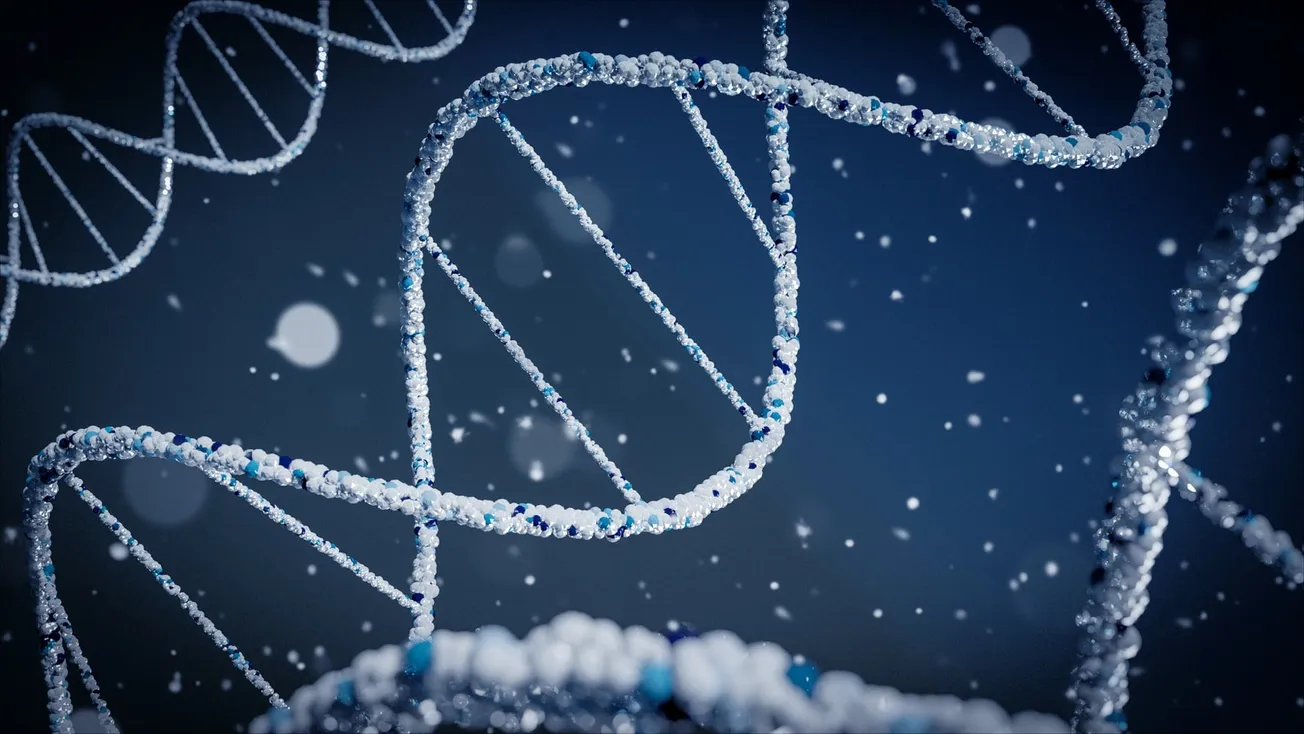Table of Contents
New Zealand Doctors Speaking Out with Science
The Covid-19 mRNA vaccines administered to billions of people across the world have raised multiple concerns, including identification of poor manufacturing practices. It is hardly surprising, then, that a group of experienced geneticists have identified significant DNA contamination in both Pfizer and Moderna vaccine vials.
A team led by Kevin McKernan investigated a total of 12 vials of Moderna and Pfizer including both bivalent and monovalent product. Varying levels of contaminating plasmid DNA were detected in every vial, in addition to the intended mRNA, exceeding safety standards set by both European Medicines Agency (EMA) and Food & Drug Administration (FDA).
An 11 April 2023 preprint publication describes in detail the scientific processes undertaken in this work, which is not accessible reading for most. World Council for Health have written an excellent summary and interpretation of the conclusions, at Red Line Crossed: DNA Contamination of mRNA “Vaccines” Poses Risk to Everyone on the Planet which we highly recommend as a basic introduction to the topic. They outline the role of plasmids, responsible for the DNA contamination, in the product manufacturing process; the threats posed to human health by DNA contamination of these injectable products; ways in which those potentially exposed can optimise their health; and they call for an immediate stop to the “vaccination program”.
In this summary we do our best to break down the science for everyone to understand. This was assisted by a scientific presentation by molecular biologist/immunologist Dr Laura Braden in March 2023, in which she referenced a Pfizer promotion published in the New York Times in April 2021. Professor Sucharit Bhakdi also presented on the topic with Dr Meryl Nass and Dr Michael Palmer at Good Morning CHD on 11 May 2023.
Transcription and Translation
Proteins provide many functions in the human body, such as forming the structure of cells, tissues, hormones and enzymes. They are continually repaired and replaced throughout the lifespan.
In order to make a protein, human double-stranded DNA in the nucleus of the cell is transcribed into single-stranded RNA. The RNA is then spliced into ‘messenger RNA’ (mRNA), which is transported from the cell nucleus and into the cytoplasm (the part of the cell outside of the nucleus). Here the mRNA is used as a blueprint for making amino acid chains, which then combine to form protein.
Protein in the body is used for structure (eg skin) and for function (eg enzymes to help us make energy from food [and] the right hormones at the right time). The body functions on protein made based on our DNA via RNA. Because of these extremely important functions, mRNA transcription and protein synthesis are tightly controlled processes in the cell, with many checks and balances to ensure fidelity.
These processes are known as transcription (DNA transcribes to RNA) and translation (RNA translates to protein), shown in simplified form in the illustration below. Understanding this helps to explain the use of plasmids in pharmaceutical manufacture.
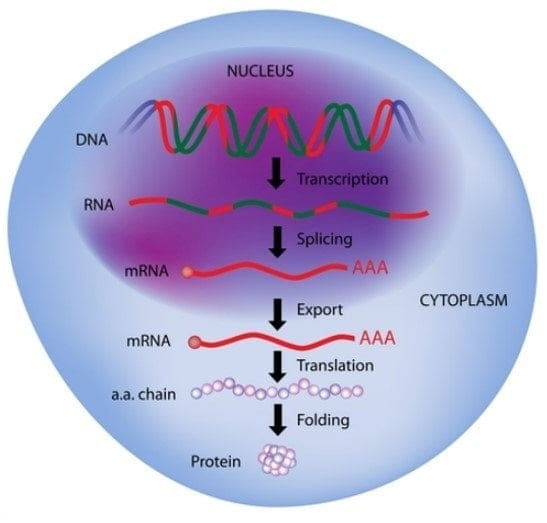
What is a Plasmid?
Plasmids are circular DNA parcels used by bacteria in nature to exchange information. They originate from and live in bacteria, are highly transmissible and can replicate independently (“replication competent”).
Characteristics of plasmids
- Their natural habitats are bacteria and archaea (single-celled organisms).
- They are replication competent.
- They often contain genes which help bacteria survive, eg antibiotic resistance is obtained from the bacterial plasmid.
- The double stranded DNA of plasmids makes them stable, meaning they do not degrade easily but they do replicate easily.
Use of plasmids in pharmaceutical product manufacture
Plasmids are commonly used in molecular biology to replicate (clone) a gene of interest. They are also used in the manufacture of certain pharmaceutical products. They can be used to transfer pieces of foreign genetic material into cells.
To produce a protein for pharmaceutical manufacturing purposes, molecular biologists take the piece of DNA they want, eg DNA of the spike protein, and use molecular scissors (enzymes) to cut the gene out of the DNA and then insert it into the plasmid, using molecular glue (enzymes). The plasmid is then inserted into the bacteria using a process known as transformation which enables rapid growth and replication.
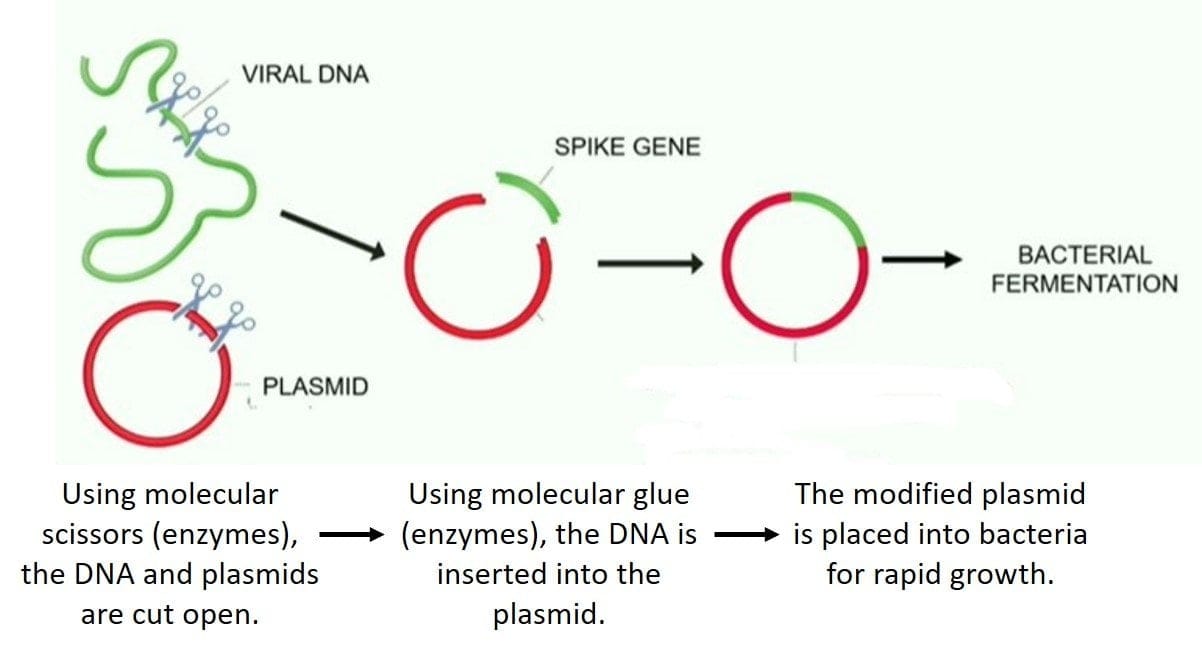
Plasmids from the bacteria Escherichia coli (E coli) are being used by Moderna and Pfizer to produce the novel mRNA in their Covid-19 injectables.

The spike-gene-modified plasmids are transferred into E coli bacteria and grown rapidly (fermented) in large vats of nutrient-rich media. After amplification bacteria are then broken apart (ie lysed), to harvest the plasmids. The spike genes (now in billions of copies) are removed from the plasmids and cut into straight segments, a process called “linearisation”.
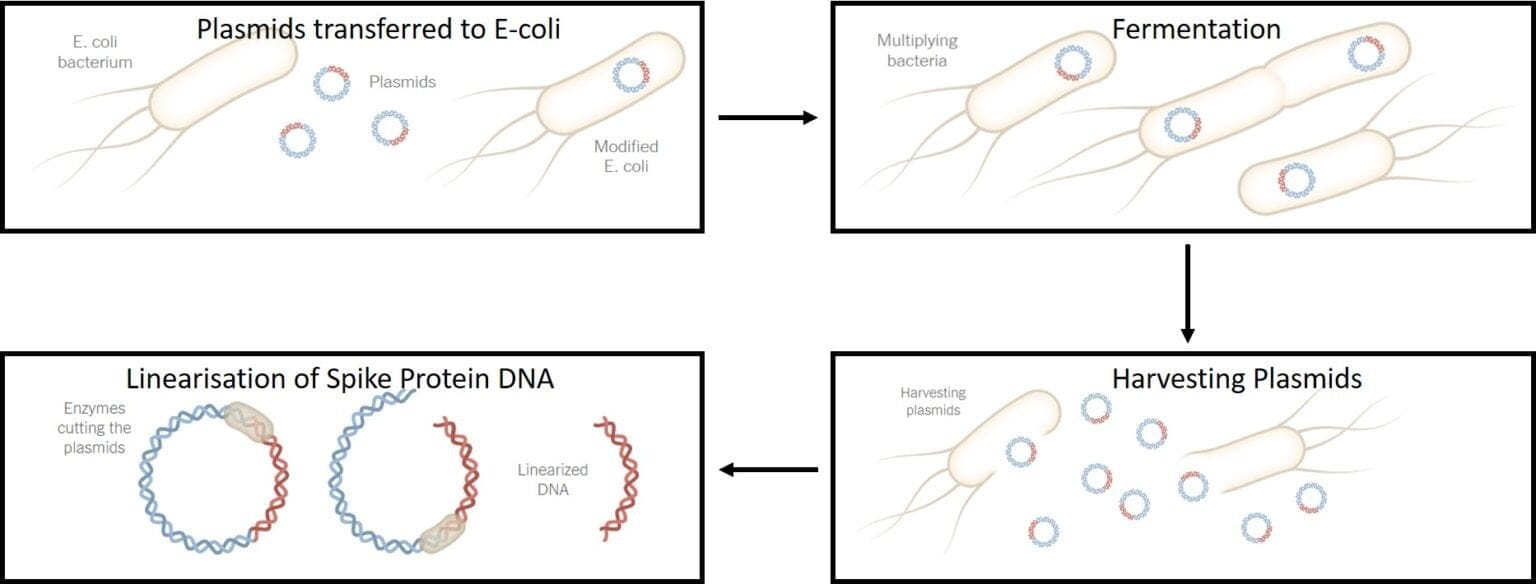
From there, further steps complete the manufacture process such as adding the lipids and enveloping the mRNA into lipid nanoparticle parcels, preparing the mixtures, removing all impurities, preparing the vials and bottling the final solution. Intense and rigorous testing is required at each step to ensure there is no contamination and that the product meets all quality standards.
Under normal good manufacturing practices, upon completion of mRNA production all plasmids would be filtered out to ensure no DNA contamination in the final product.
Detection of DNA Contamination in Pfizer and Moderna Vials
McKernan et al detected plasmids in 100 per cent of the vials they examined. The plasmids were wrapped in lipid nanoparticles (LNPs) used to transport the genetic material to human cells. LNPs are highly efficient at transporting substances throughout the body including to cells in all organs, across the blood-brain barrier, across the placental barrier and into breastmilk.

So, not only did they find plasmids with DNA instructions for spike protein in the ‘vaccines’ but the plasmids were wrapped in LNPs meaning they can easily get into all the body’s cells, the nucleus and ultimately our genes. Furthermore, these plasmids contained genes for antibiotic resistance towards neomycin and kanamycin. These antibiotics are life saving, but can be rendered useless when circulating bacteria become resistant to their action.
This DNA contamination poses multiple risks to human health relating to the integration of foreign genes into the human genome, with potential for inflammatory processes, development of cancer and transmission of the genes to offspring leading to inter-generational harms. The concerns are detailed further by World Council for Health, condensed briefly here:
- Beneficial E coli species reside in the human gut as a protective bacteria in what is known as the microbiome. The plasmids for the injection are manufactured using E coli in the laboratory. These plasmids are designed by nature to integrate with other E coli in the microbiome. Should plasmids in the injection integrate with the E coli in the gut, there is potential for prolonged and uncontrolled production of spike protein. This would pose a permanent risk for ongoing harms related to spike protein circulation, as well as disruption of the human genome leading to higher risks of cancer and virtually all other diseases.
- Healthy adults exhale bacteria from the gut microbiome with each breath. Vaccinated adults may be exhaling manufactured plasmids which instruct our cells to produce spike protein. This poses a potential inhalation (shedding) risk to all individuals in close proximity, regardless of vaccination status.
- The sequencing analysis clearly showed presence of antibiotic-resistant plasmids, posing a risk for integration of antibiotic resistance into the E coli of the human microbiome. This process of information exchange, within and even between bacterial species, has been known about for decades.
Given that the microbiome is integral to wellness, and given the usual abundance of E coli in the gut, there is huge potential for significant harm to human health. Already urinary infections are more common, as are infections of all types, due to antibiotic-resistant organisms.
Dr Sabine Hazan is a medical specialist and gut bacteria expert. She has found major damage to the microbiome following the jabs. An abundant and highly important species called bifidobacteria goes to zero.
What is the Big Picture Here?
It must be asked if this DNA contamination is intentional on the part of the pharmaceutical companies, who appear to be disregarding all basic principles of safe manufacture at the risk to public health on a mass scale. Pfizer’s recent acquisition of Seagen, a cancer drug developer, could suggest prior knowledge.
Plans by WHO and their various corporate partners for an additional 500 vaccines, almost exclusively using this unregulated, dangerous mRNA platform, must be efficiently and permanently cancelled. The ‘exceptional return on investment’ corrupting public health requires a firm and permanent removal of corporate influence from research and policy. A return to rigorous and ethical science is needed urgently.
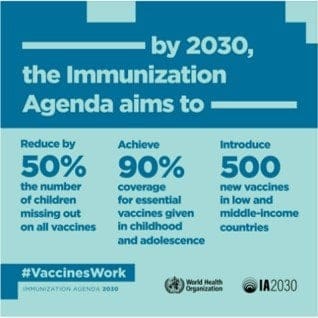
In his interview below with Veronika Kyrylenko, Canadian physician Dr Mark Trozzi rightly describes events playing out as a violent crime. While it seems the injections and those behind them get darker every day, knowledge is power and we the people need to use it.
Watch: Severe Risks of DNA Contamination of mRNA Covid Shots
!function(r,u,m,b,l,e){r._Rumble=b,r[b]||(r[b]=function(){(r[b]._=r[b]._||[]).push(arguments);if(r[b]._.length==1){l=u.createElement(m),e=u.getElementsByTagName(m)[0],l.async=1,l.src="https://rumble.com/embedJS/u4"+(arguments[1].video?'.'+arguments[1].video:'')+"/?url="+encodeURIComponent(location.href)+"&args="+encodeURIComponent(JSON.stringify([].slice.apply(arguments))),e.parentNode.insertBefore(l,e)}})}(window, document, "script", "Rumble");Rumble("play", {"video":"v2i6ymy","div":"rumble_v2i6ymy"});
The NZDSOS media team extend our warm appreciation to Dr Laura Braden for her assistance in proof reading/editing this article.

